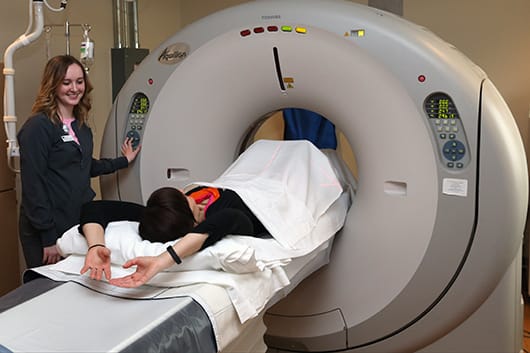Computed Tomography (CT)
 Computed Tomography (CT) — also known as computerized tomography or computed axial tomography — is an advanced X-ray technology that produces a sequence of detailed cross-sectional images of the body. The complex images are produced by rotating a focused X-ray beam around the patient and taking these X-ray images from numerous angles, guided by a computer. CT examinations produce detailed organ studies by capturing multiple individual image slices. The Iowa Clinic offers CT scanning for both pediatric and adult patients.
Computed Tomography (CT) — also known as computerized tomography or computed axial tomography — is an advanced X-ray technology that produces a sequence of detailed cross-sectional images of the body. The complex images are produced by rotating a focused X-ray beam around the patient and taking these X-ray images from numerous angles, guided by a computer. CT examinations produce detailed organ studies by capturing multiple individual image slices. The Iowa Clinic offers CT scanning for both pediatric and adult patients.
How Do I Prepare?
If you are having a CT of the abdomen or pelvis, please:
- arrive one hour prior to your exam to drink the oral contrast.
- do not eat or drink for four hours prior to the exam.
- only drink small amounts of water to take needed medications.
If you are having any other type of CT exam, please:
- arrive 30 minutes early.
- do not eat for one hour prior to your exam.
What Should I Expect?
For your CT examination you will be asked to lie on a table that rides on a track through the helical scanner. As the procedure begins, you will hear humming, buzzing or clicking sounds from the CT machine. The table will move in short steps through the scanner as the CT tube rotates around you. At each step, the scanner completes a separate view. The information is processed by the computer and displayed as images on a video screen to the technologist.
You should remain as still as possible to produce the clearest images. Depending upon the procedure being performed, you may be asked to hold your breath for up to 30 seconds. Most exams require 15 to 45 minutes to complete.
If you are given contrast medium intravenously, you may notice a metallic taste in your mouth and a warm sensation throughout your body. These sensations are harmless and subside within a few moments. Oral contrast medium may cause slight changes in bowel movements, which will soon return to normal.
Some patients may have an allergic reaction to the contrast medium, which is iodine-based. Patients who are allergic to iodine may experience :
- itching
- sneezing
- other allergic symptoms
If you are allergic to iodine but must be given contrast medium to produce the proper test results, your physician may choose to pre-medicate you with steroids or other drugs. Anyone experiencing such a reaction will be treated before being released to go home.
In rare cases, the contrast medium can trigger anaphylaxis, a life-threatening allergic reaction in which the tissues of the airway become swollen enough to restrict breathing. In such cases, emergency treatment is immediately given.
Please let us know if you know or think you are allergic to iodine.
Patients who have diabetes or renal disease require special care because the kidneys are involved in filtering iodine from the bloodstream. These patients should consult with their physician about proper scheduling of the CT scan.
After your procedure, your physician will receive a copy of your report within 48 hours and give those results to you.